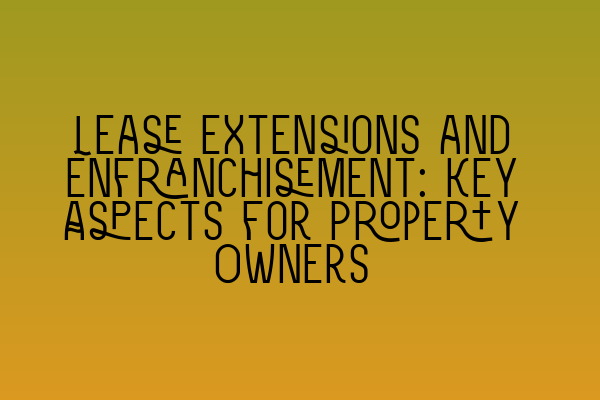Lease Extensions and Enfranchisement: Key Aspects for Property Owners
As a property owner, you may be familiar with the concept of leasehold ownership. Many properties in the UK are held on a leasehold basis, which means that you own the property for a fixed period of time, typically between 99 and 999 years. However, as the lease term starts to diminish, it can have a significant impact on the value and marketability of your property. This is where lease extensions and enfranchisement come into play.
A lease extension is the process by which a leaseholder extends the term of their lease, effectively resetting the clock and ensuring that they have a prolonged period of ownership. On the other hand, enfranchisement refers to the right of leaseholders to collectively purchase the freehold of their building or estate. Both of these options can provide significant benefits to property owners, and understanding the key aspects is crucial.
1. Lease Extensions:
If you are a leaseholder and your lease is nearing the critical 80-year mark, it is essential to consider a lease extension. This is because once a lease drops below 80 years, the cost of extending the lease becomes significantly higher due to the “marriage value.” The marriage value is the increase in the value of the property that occurs when the lease is extended, and it is split between the landlord and the leaseholder.
To initiate the lease extension process, you will need to serve a formal notice on your landlord, outlining your intention to extend the lease. This notice must comply with specific legal requirements, such as including the premium you are willing to pay for the extension. It is always advisable to consult with a solicitor who specializes in lease extensions to ensure that the notice is correctly drafted and served within the required timeframe.
2. Enfranchisement:
Enfranchisement is an option available to leaseholders who want to take control of their property by purchasing the freehold. This process is particularly relevant for leasehold houses or blocks of flats where the leaseholders meet certain criteria. By acquiring the freehold, leaseholders become the outright owners of the property, and they also gain control over the management and maintenance of the building.
To proceed with enfranchisement, a majority of leaseholders (at least 50%) in the building or estate must participate. The process involves serving a formal notice on the landlord, specifying the price being offered for the purchase. Valuation experts will determine the price through a complex calculation, taking into account factors such as the value of the property and the remaining length of the leases.
It is important to note that enfranchisement can be a complex process, requiring legal expertise to navigate through the various stages. Seeking professional advice from a solicitor with experience in property law and enfranchisement is highly recommended.
3. Benefits of Lease Extensions and Enfranchisement:
The benefits of lease extensions and enfranchisement are numerous and can have a significant impact on the value and enjoyment of your property.
a. Increased Property Value: By extending the lease or acquiring the freehold, you increase the value of your property. A longer lease term or freehold ownership makes your property more attractive to potential buyers and lenders.
b. Greater Control: Through enfranchisement, leaseholders gain more control over the management and maintenance of their property. This allows for more efficient decision-making processes and potential cost savings.
c. Security and Peace of Mind: Having a longer lease or owning the freehold provides security and peace of mind for both current and future generations. Leaseholders can avoid the uncertainty and potential difficulties associated with shorter lease terms.
d. Removal of Ground Rent: Lease extensions can remove or significantly reduce ground rent obligations, saving leaseholders considerable annual expenses.
4. Conclusion:
Lease extensions and enfranchisement offer valuable opportunities for property owners to secure their investments and gain greater control over their properties. Whether you opt for a lease extension to safeguard your lease term or choose to participate in enfranchisement to acquire the freehold, it is crucial to seek professional advice from a property law specialist to navigate the legal complexities of these processes.
At SQE Property Law & Land Law, our team of solicitors has extensive experience in lease extensions, enfranchisement, and all aspects of property law. We understand the importance of these processes and are committed to providing expert advice and guidance to property owners throughout the UK.
Contact us today to discuss your lease extension or enfranchisement needs, and let our experienced solicitors help you secure your property’s future.
Related Articles:
– SQE 1 Practice Exam Questions
– SQE 1 Practice Mocks FLK1 FLK2
– SQE 2 Preparation Courses
– SQE 1 Preparation Courses
– SRA SQE Exam Dates
